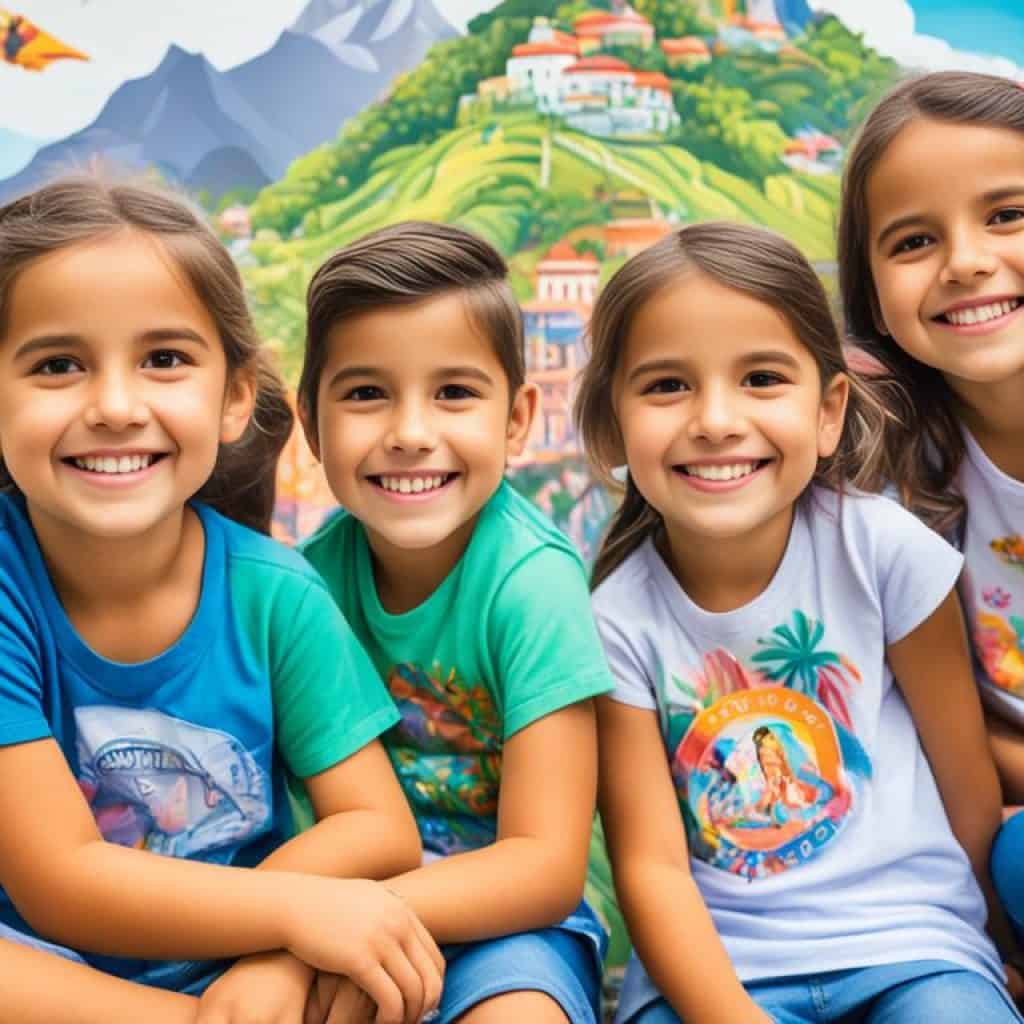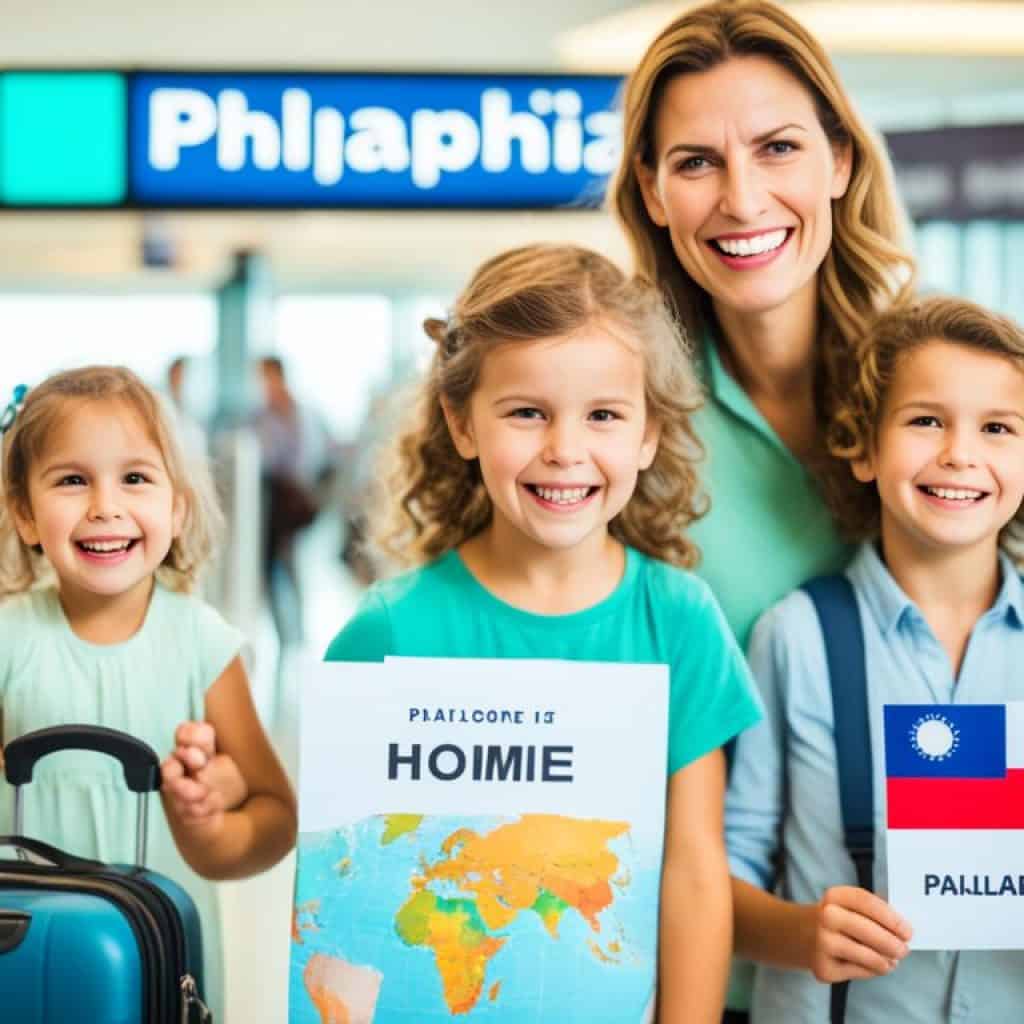Have you ever wondered how to adopt a child in the Philippines? This Southeast Asian country offers a warm and welcoming environment for families looking to expand through adoption. With a well-established adoption process and the presence of the National Authority for Child Care (NACC), adopting in the Philippines can be a rewarding and life-changing experience. So, are you ready to discover the step-by-step guide to adopting in the Philippines?
Key Takeaways:
- The Philippines has a well-regulated adoption process overseen by the National Authority for Child Care (NACC)
- Eligibility criteria include being a married heterosexual couple or a single woman aged 27 and older
- Children available for adoption are typically aged 7 to 15, with medical needs or sibling groups also being matched
- The adoption process in the Philippines involves several steps, including a one-week trip to the country
- Adoption costs vary, and funding options may be available
Eligibility Requirements for Adoption in the Philippines
To be eligible to adopt in the Philippines, applicants must meet certain criteria. The requirements for adopting a child in the Philippines are as follows:
- Marital Status: Applicants must be a married heterosexual couple or a single woman aged 27 and older.
- Duration of Marriage or Cohabitation: Couples must have a minimum of three years of marriage, or if cohabiting, one year of marriage and two years of cohabitation.
- Age Difference: Adoptive mothers must not be more than 45 years older than the child at the time of referral.
- Religious Practice: Strong family religious practice for at least five years is preferred.
- Relative Adoptions: Relative adoptions are welcome.
- Health and Criminal Background: All applicants should be in good physical and mental health and have a clean criminal history.
Specific eligibility requirements may vary and can be discussed with adoption agencies for a more detailed understanding of the process.
Adopting a child is a significant decision, and ensuring that prospective adoptive parents meet the eligibility criteria is essential for the well-being and welfare of the child. By fulfilling these requirements, individuals and couples can embark on the journey of providing a loving and stable home for a child in need.
Image:
Children Available for Adoption in the Philippines
In the Philippines, there are many wonderful boys and girls available for adoption. They range in age from 7 to 15 years old and may have specific medical needs or be part of sibling groups. These children have been placed into care for various reasons, including the unfortunate circumstances of the death of one or both parents, poverty, abandonment, abuse, neglect, social stigma, or special needs. Despite their difficult beginnings, these children have so much love and potential to offer to their future families.
The National Authority for Child Care (NACC) and the dedicated staff involved in the adoption process work tirelessly to ensure that each child is matched with the most suitable and loving family. Personalized factors such as religious practice, physical similarity, or shared talents are taken into consideration to find the perfect match. The aim is to create a harmonious and nurturing environment where the child can thrive and flourish.
“Every child deserves a loving home and a bright future. When you adopt a child from the Philippines, you are not just changing their life. You are creating a legacy of love and compassion that will last for generations.”
Adopting a child from the Philippines is a truly life-changing experience. The joy and fulfillment that comes from welcoming a child into your family and providing them with a safe and nurturing home is immeasurable. Your love and support can give them the opportunity to grow, learn, and achieve their dreams.

By adopting a Filipino child, you are not only giving them a chance at a better future but also enriching your own life in ways you never thought possible. The resilience and strength these children possess will inspire and uplift you, reminding you of the power of love and transformation.
| Benefits of Adopting a Filipino Child | Challenges of Adopting a Filipino Child |
|---|---|
|
Adopting a child from the Philippines is a challenging yet rewarding journey. With the love and commitment of potential adoptive parents like you, these children can have a promising future filled with happiness, stability, and opportunities. Take the first step today and make a difference in the life of a Filipino child.
The Adoption Process in the Philippines
Adopting a child in the Philippines involves a step-by-step process that ensures legal adoption and a smooth transition for both the child and adoptive parents.
The adoption process typically includes the following steps:
- Eligibility checks and application: Prospective adoptive parents need to complete the necessary eligibility checks and submit an application to an adoption agency. These checks help ensure that the parents meet the requirements set by the National Authority for Child Care (NACC).
- Home study: The adoption agency conducts a comprehensive home study to assess the prospective adoptive parents’ readiness to provide a safe and nurturing environment for the child. This assessment includes interviews, home visits, background checks, and documentation verification.
- Matching and referral: Once approved, the adoption agency will match a child with the prospective adoptive parents based on their preferences, the child’s needs, and compatibility factors. The agency will provide detailed information about the child, including their background, medical history, and any special needs.
- Travel to the Philippines: The adoptive parents will travel to the Philippines for a one-week trip to meet the child in person and complete the necessary legal paperwork. This trip allows the parents and child to bond and facilitate a smooth transition.
- Post-placement visits and reports: After bringing the child home, the adoptive parents are required to complete post-placement visits and reports. These visits help assess the child’s well-being and ensure a successful integration into the adoptive family.
- Finalization and immigration processes: The finalization of the adoption takes place in the Philippines, where a court legally declares the child as the adoptive parents’ rightful child. Immigration processes are also completed to ensure the child’s entry into the United States, if applicable.
Throughout the adoption process, communication and collaboration between the adoptive parents and the adoption agency are essential. The agency provides guidance, support, and resources to facilitate a successful adoption journey.
Benefits of the Adoption Process in the Philippines
“The Philippines’ adoption process prioritizes the best interests of the child and ensures legal compliance, allowing families to embark on the rewarding journey of parenthood.”
By following this structured process, adoptive parents can navigate the complexities of adoption while adhering to the legal requirements. The Philippines adoption process aims to protect the rights and welfare of the child, providing a solid foundation for a loving and permanent family.
Traveling to the Philippines for Adoption
When it comes to adopting a child in the Philippines, prospective parents need to be prepared for travel as an integral part of the adoption process. Traveling to the Philippines allows you to meet your future child and complete the necessary paperwork, bringing you one step closer to becoming a forever family.
A one-week trip to the Philippines is typically required as part of the adoption process. During this time, you will have the opportunity to spend quality time with your child, getting to know them and establishing a bond. It’s recommended for both parents to make the trip, but if only one parent can travel, that person must be a U.S. citizen.
The accommodations in the Philippines are modern and comfortable, ensuring a pleasant stay during your trip. English is widely spoken, making it easier to communicate with adoption agency staff, local authorities, and other professionals involved in the adoption process.
Throughout your trip, support services will be provided to assist you with the adoption process. Adoption agency staff will guide you through the necessary paperwork, help arrange meetings with the appropriate authorities, and provide any additional support you may need. They understand that this journey is both exciting and emotionally challenging, and they are dedicated to ensuring a smooth and positive experience for your family.

Traveling to the Philippines for adoption is not only a practical requirement but also an opportunity to begin forming a bond with your future child. It allows you to experience the culture and environment firsthand, creating memories that will last a lifetime.
Adoption Costs in the Philippines
When considering adopting a child in the Philippines, it’s important to understand the associated costs. Adoption fees can vary depending on the adoption agency and the specific circumstances of the adoption. These fees typically cover administrative costs, home study fees, legal fees, travel expenses, and post-placement fees.
Here is a breakdown of the potential costs involved in adopting a child in the Philippines:
| Expense | Estimated Cost |
|---|---|
| Administrative Costs | $1,000 – $3,000 |
| Home Study Fees | $1,500 – $3,000 |
| Legal Fees | $2,000 – $5,000 |
| Travel Expenses | $3,000 – $6,000 |
| Post-Placement Fees | $1,000 – $2,500 |
Please note that these are estimated costs and can vary depending on the specific circumstances of each adoption. It is recommended to consult with adoption agencies to get a more accurate breakdown of fees based on your individual situation.
While adoption can be a significant financial commitment, there are funding options available to assist with the costs. Some families may be eligible for adoption tax credits or grants specifically for adoption expenses. Adoption agencies can provide information on potential funding options and guide you through the process.
Ultimately, the cost of adopting a child in the Philippines should not deter prospective parents from pursuing their dream of expanding their family through adoption. The joy and fulfillment of providing a loving home to a child in need are immeasurable.
Hague Convention and Adoption in the Philippines
The Philippines is a signatory to the Hague Convention on intercountry adoption, ensuring that adoption processes in the country adhere to international standards. Adoptions in the Philippines must comply with both Philippine law and Hague requirements, as well as meet the immigration requirements of the adoptive parents’ country. The Hague process is particularly applicable to American citizens adopting in other countries.
However, it is important to note that if the adoptive parents are Filipino citizens residing in the Philippines and are adopting a close relative who is also a Filipino, the adoption process is considered internal. In such cases, there is no requirement to comply with Hague requirements. The adoption process is facilitated within the Philippines and follows the guidelines set by the Philippine government.
Consulting with legal professionals is essential to fully understand the specific requirements and processes involved in Hague adoption and internal adoption scenarios. They can provide guidance and ensure that all steps of the adoption journey are legally and ethically sound.
Comparing Hague and Internal Adoption Processes
| Hague Convention Adoption | Internal Adoption |
|---|---|
| Compliance with Hague requirements | No requirement to comply with Hague requirements |
| Adoption facilitated through intercountry agencies | Adoption facilitated within the Philippines |
| Strict adherence to international adoption standards | Adherence to Philippine adoption guidelines |
| Require participation of Central Authority | No involvement of Central Authority |
| Necessary steps to meet U.S. immigration requirements | No additional steps for U.S. immigration requirements |
Comparison of Hague Convention Adoption and Internal Adoption in the Philippines
Understanding the distinctions between Hague and internal adoption processes is crucial for adoptive parents to ensure they follow the appropriate legal framework. It is recommended to seek professional advice and work with adoption agencies familiar with both options to navigate the process smoothly and successfully.
Adoption Challenges and Success Stories in the Philippines
Adopting a child in the Philippines, especially older children, can present unique challenges. However, despite these challenges, many families have had incredibly successful adoption experiences and witnessed the transformation of their adopted children’s lives. It is crucial to understand and acknowledge the unique needs of older children and provide them with the necessary support, care, and love.
While every adoption journey is different, numerous families have shared inspiring success stories of their adoption experiences in the Philippines. These stories highlight the resilience, adaptability, and happiness that adopted children have found in their new families. From overcoming obstacles to thriving in a loving environment, these success stories serve as testaments to the transformative power of adoption.
“Adopting our son from the Philippines was one of the most rewarding decisions we’ve ever made. Despite the initial challenges of adjusting to a new family and environment, he has grown into a confident and happy young man. It’s truly incredible to witness his personal growth and see him flourish.”
Each adoption journey comes with its own set of challenges and joys. It is essential for prospective adoptive parents to be prepared and educated about the potential obstacles they may encounter in the adoption process. By understanding and addressing these challenges, families can navigate the adoption journey with resilience and perseverance.
Adopting a child from the Philippines requires patience, commitment, and the readiness to provide a nurturing environment. Supporting older children through their unique experiences and helping them overcome any hurdles they may face is crucial to their successful integration into their new family. With the right resources, guidance, and support, families can create a loving and stable home for their adopted children.
Key Adoption Challenges
- Adjustment period for both the child and the adopting family
- Language and cultural barriers
- Emotional trauma and attachment issues
- Addressing the child’s medical, psychological, or educational needs
- Building trust and establishing a secure attachment
Success Stories: Overcoming Challenges
Despite the challenges, there have been countless heartwarming success stories of families who have adopted children from the Philippines and created a nurturing and loving environment for them. These stories highlight the resilience, strength, and growth of both the children and their adoptive families.
“Our daughter joined our family when she was twelve years old, and witnessing her transformation has been truly remarkable. While she faced significant challenges in her early life, her resilience and determination have enabled her to thrive. We are so proud of the young woman she has become.”
These success stories serve as a beacon of hope and inspiration, demonstrating the immense potential for positive change through adoption. They illustrate the rewards and fulfillment that come with providing a stable, loving, and supportive environment for a child in need.
The Role of Adoption Agencies in the Philippines
Adoption agencies play a crucial role in the adoption process in the Philippines. They work closely with families to provide guidance, support, and assistance throughout the process. Adoption agencies facilitate home studies, match children with families, provide information on eligibility requirements, and help navigate the legal and administrative aspects of adoption.
When considering adoption in the Philippines, it is important for families to research and choose a reputable adoption agency that specializes in international adoptions and has experience in the country. These agencies have the expertise and resources to guide families through the complexities of adoption, ensuring a smooth and successful journey.
The role of adoption agencies extends beyond paperwork and logistics. They also offer emotional support and counseling services to help families prepare for the joys and challenges of adoption. These agencies understand the unique needs of adoptive families and provide resources to ensure a healthy and nurturing environment for the child.
By collaborating with adoption agencies, families can receive the necessary guidance and support to navigate the adoption process in the Philippines, from initial inquiries to post-adoption services. Adopting a child is a life-changing decision, and having the expertise of adoption agencies can make the process more manageable and fulfilling.
Legal Considerations for International Adoption
When embarking on the journey of international adoption, it is crucial to navigate the legal requirements of both the child’s country of birth and the adoptive parents’ country of residence. For those considering adopting a child from the Philippines, understanding and complying with Philippine adoption laws, Hague requirements (if applicable), and U.S. immigration requirements is vital.
The Philippines Adoption Laws
Adopting a child from the Philippines requires adherence to the country’s adoption laws. These laws outline the eligibility criteria, adoption processes, and any additional requirements set forth by the Philippine government. It is essential to engage legal professionals familiar with international adoption and Philippine adoption laws to ensure all legal considerations are met.
Hague Adoption Convention Requirements
If adopting a child from a Hague Convention Country, including the Philippines, additional requirements may apply. The Hague Adoption Convention is an international agreement that establishes safeguards and procedures for intercountry adoptions to protect the best interests of the children involved.
Adoptive parents must ensure compliance with Hague requirements, which may include: obtaining a valid home study, the use of accredited adoption agencies or attorneys, and adhering to specific reporting and documentation procedures.
U.S. Immigration Requirements
Adoptive parents must also meet U.S. immigration requirements to bring the child to their country of residence. This involves filing the necessary forms, obtaining the appropriate visas, and providing evidence of the legal adoption. The U.S. Citizenship and Immigration Services (USCIS) provides detailed information and guidance on the immigration process for adopted children.
Seeking Legal Guidance
To navigate the complex legal landscape of international adoption, it is advisable to consult legal professionals with expertise in adoption law. These specialists can offer guidance and ensure all legal requirements are met, reducing the risk of complications and ensuring a successful adoption process.
Support and Resources for Adoptive Families
Adoptive families in the Philippines can find invaluable support and access to numerous resources throughout their adoption journey. Adoption agencies play a pivotal role in providing assistance, guidance, and post-placement support to help families navigate the challenges and joys of adoption. These agencies offer a range of services, including counseling, educational resources, and information on parenting techniques specific to adoptive families.
Additionally, online communities, support groups, and forums can connect adoptive families with others who have undergone similar experiences. These networks provide a valuable platform for sharing advice, exchanging stories, and offering emotional support. By joining these communities, families can build relationships and find solace in the understanding and encouragement of fellow adoptive parents.
It is crucial for adoptive families to build a strong support system. Surrounding themselves with individuals who have firsthand experience in adoption can provide reassurance and guidance during the ups and downs of the journey. Through the support and resources available, adoptive families can find a sense of belonging and receive the necessary tools to navigate the complexities of adoption successfully.

Support services and resources create a vital network for adoptive families. They offer reassurance, guidance, and a community of individuals who can relate to their unique experiences.
Conclusion
Adopting a child in the Philippines is a meaningful and life-changing journey. Despite the eligibility requirements, specific adoption processes, and potential challenges, numerous families have successfully provided loving homes to children from the Philippines. To ensure a smooth and legally compliant adoption, it is crucial to gather information, collaborate with reputable adoption agencies, and seek professional guidance throughout the process.
With patience, dedication, and the support of the adoption community, families can navigate the complexities of adopting a child in the Philippines. The rewards of giving a child a loving and supportive family are immeasurable, and many successful adoption stories testify to the transformative power of adoption.
As prospective adoptive parents, it is important to educate oneself about the adoption process, understand the unique needs of older children, and be prepared for the challenges and joys that come with adoption. Building a strong support system and accessing available resources can provide invaluable support and guidance along the way.
In conclusion, adopting a child in the Philippines is an incredible opportunity to bring love, stability, and bright futures to children in need. By embarking on this journey with proper preparation and support, families can experience the joy of welcoming a child into their hearts and homes, creating a lifelong bond that will enrich both the child and the family.


















Add comment